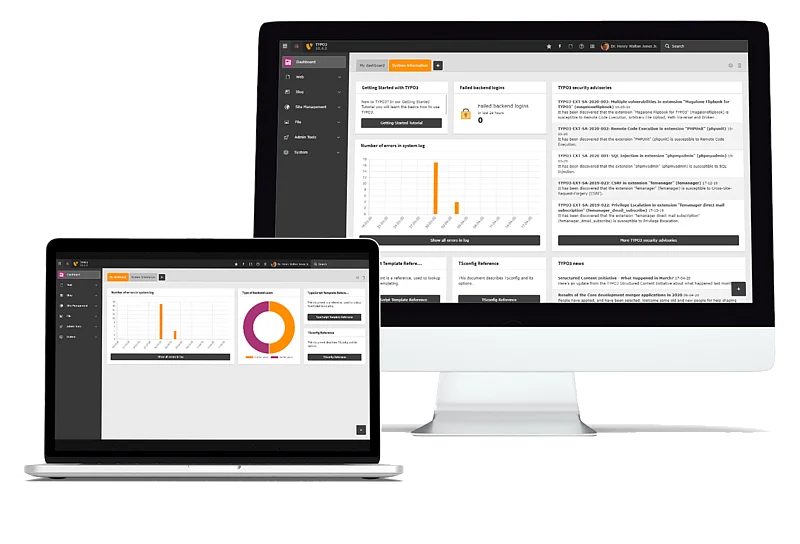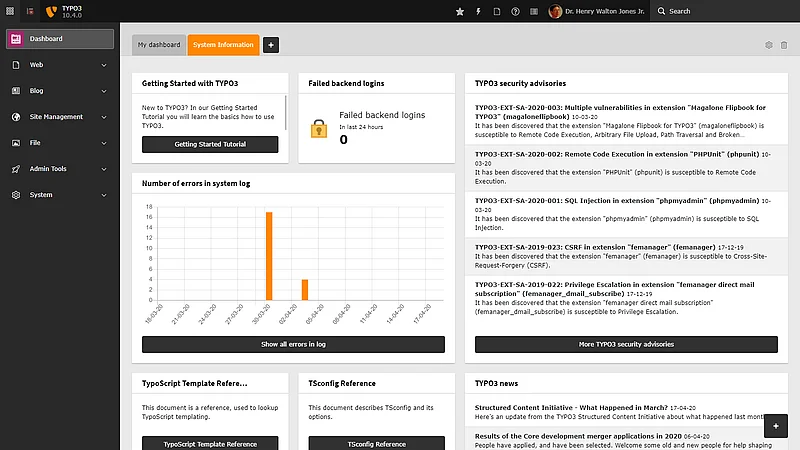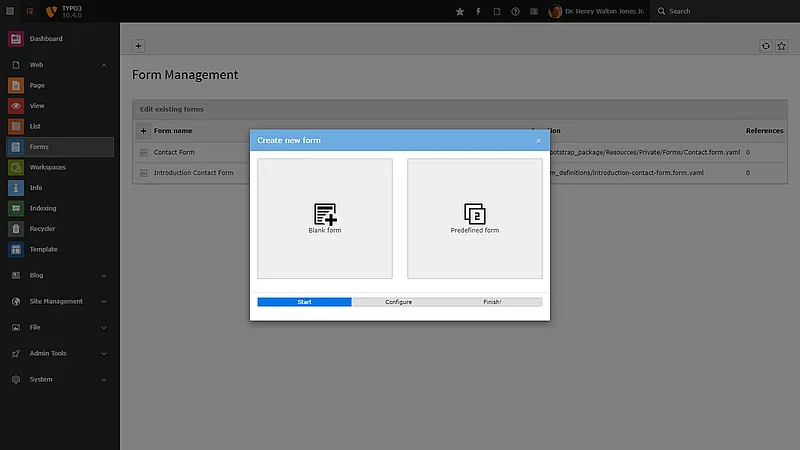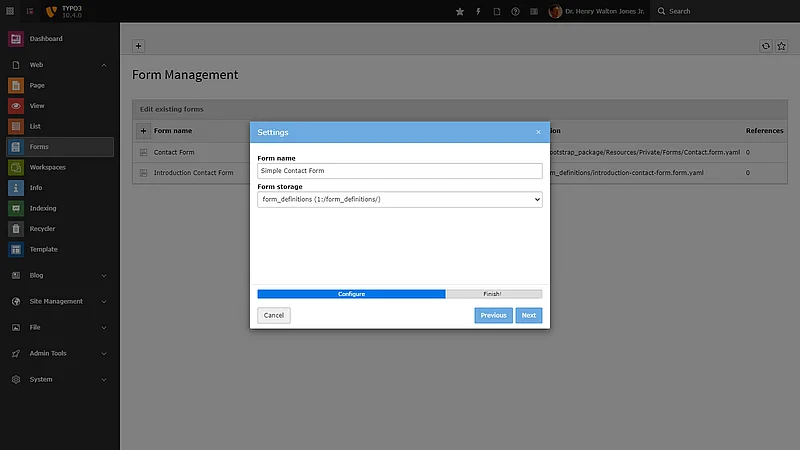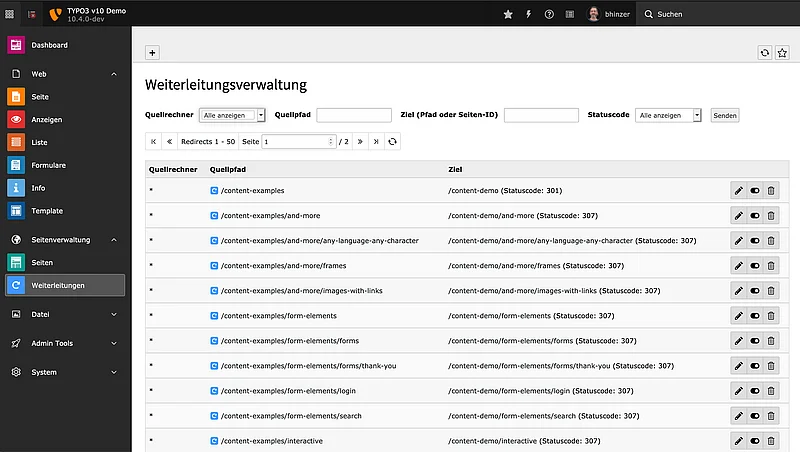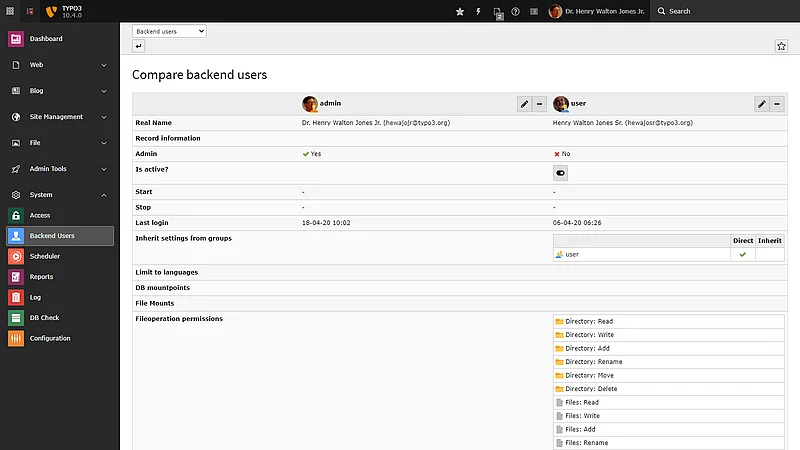TYPO3 v10 LTS
TYPO3 v10 LTS was released on 21.04.2020. LTS stands for Long Term Support. This means that TYPO3 v10 LTS receives three years of free support from the TYPO3 community.
In addition, a further three years of support can be booked for a fee via the ELTS program of TYPO3 GmbH. The maximum support period for TYPO3 v10 LTS thus ends on 30.04.2026.
As in the previous, very successful LTS versions of TYPO3, TYPO3 v10 LTS combines all the functions of the 10 versions into a particularly stable release. Below we have compiled the most important new features and functions of TYPO3 v10 LTS for you.
A new menu item "Dashboard" is now available in the TYPO3 backend, which provides a configurable interface for widgets. In addition to important key data of the TYPO3 installation, statistics or information and news, TYPO3 integrators or developers can register their own new widgets here at any time.
As the requirements for dashboards can vary greatly, integrators can create different presets for users and assign them to the respective users accordingly.
For example, widgets with key figures from Google Analytics can be realized for online editors, while administrators can have system information or error messages presented prominently on the dashboard.
Simplified creation of forms
Since TYPO3 v8 LTS, forms have been part of the basic TYPO3 CMS. Therefore, third-party software is rarely required to create and permanently save forms. With the native "Form" extension, forms can be saved in the file system in a versionable way. These saved forms can then even be exchanged between different TYPO3 systems.
Additional configurations can be used to define different storage locations for forms, for example to make them accessible to different user groups.
SEO friendly URLs and redirects
Since version 8, TYPO3 already offers the option of configuring so-called "speaking URLs" without the use of a third-party extension. In the past, older versions of TYPO3 usually used the "RealURL" or "CoolURI" extensions for this purpose. With version 10, TYPO3 now has an extension of the so-called routing functionality, with which the URL segment (slug) of a page can simply be regenerated, overwritten and forwarded.
The use case
If you have already created a page in TYPO3 in the past, added content and then published it, the page was accessible via a "speaking URL" on the website. Search services such as Google crawler, index, save and ultimately publish these pages with the path in their search index.
In the past, if you wanted to adjust the path segment via the TYPO3 backend, the new URL was published directly when the change was saved. If you had now "forgotten" to redirect the old URL, visitors via search services and Google itself would come to nothing. The old page was no longer accessible - a 404 error message ("Page not found") was displayed.
With TYPO3 version 10, the system now automatically creates a redirect for the old URL to the new path. Visitors are thus automatically redirected to the correct page. If necessary, the editor can of course reverse this change at the touch of a button.
The fact that this function also adapts recursively for all subpages if the path of a top page is changed is particularly well thought-out.
In the separate "Redirects" module, the type of redirects can be adjusted, fine-tuned and corrected.
HTML-based e-mail templates
Until today, TYPO3 system emails were pure text emails. TYPO3 v10 LTS now supports template-based HTML and text emails thanks to the Fluid Templating Engine. Several TYPO3 system emails use the new format, for example notification emails that are triggered when a user logs in to the backend and emails that are sent to users when the workspace of an element changes. By overriding the default paths to the Fluid template files, developers and integrators can implement their own custom email templates.
A typical use case for the new emails are system-generated notifications with individual colors and with your own brand logo.
User administration with comparison function
The backend user accounts are among the most important data sets in a TYPO3 system. Managing user accounts, including user information and permissions, is not easy without a clear and well-curated overview.
The backend user module therefore offers a detailed view for TYPO3 administrators as of TYPO3 v10 LTS. First, the basic user data such as the actual name, e-mail address and start/stop date are displayed, followed by group membership, authorizations, etc.
This makes it easy to compare and set different users with their corresponding access rights.
Further functions of TYPO3 v10 LTS
Improved privacy and security
Any improvement that strengthens the security of a website and protects the privacy of users is important. TYPO3 v10 LTS now supports SameSite cookies to further enhance user privacy. All external links processed by TYPO3's TypoLink feature use the tag attribute rel="noopener noreferrer" by default, so that the sending website is not passed to the link destination. Passwords are always cryptographically encrypted. TYPO3 supports well-known algorithms such as Argon2i and PBKDF2.
Link Validator: No more broken links
TYPO3's Link Validator is an automatable process within the TYPO3 Scheduler and can automatically recognize faulty links and inform the website operator. This function has been extended and now supports pages, files and external links. External links can now be checked while they are being edited.
And what else does TYPO3 offer?
Currently supported TYPO3 versions with Long-Term-Support (LTS):
- Here you can find the TYPO3 v13 LTS features and changes.
- Here you can find the TYPO3 v12 LTS features and changes.
- Here you can find the TYPO3 v11 LTS features and changes.
TYPO3 versions with Extended Long-Term Support (ELTS), which can be obtained for a fee from TYPO3 GmbH partners:
- Here you can find the TYPO3 v10 ELTS features and changes.
- Here you can find the TYPO3 v9 ELTS functions and changes.
Older TYPO3 versions without support:
- Here you can find the TYPO3 8 LTS features and changes.
- Here you can find the TYPO3 7 LTS features and changes.
- Here you can find the TYPO3 6 LTS functions and changes.
- Here you can find the TYPO3 4.7 features and changes.


